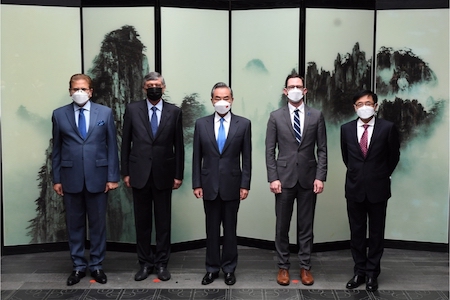|
Axis of Logic
Finding Clarity in the 21st Century Mediaplex
China
The development and challenges of Chinese-Russian dedollarization
By Wang Xiaoquan
from Dongsheng News
Sunday, Apr 17, 2022
 |
|
Chinese Foreign Minister Wang Yi held a meeting with representatives from Russia, US, and Pakistan on the Afghan Issue in Tunxi, Anhui Province on March 31, 2022. [Xinhua] |
Context
Since the beginning of the 2022 Russian-Ukrainian conflict, the US has imposed sanctions on Russia in multiple areas, but particularly in the financial area by banning Russian institutions from the SWIFT global payments system. This has triggered discussions in China about how to respond to future financial sanctions imposed by the US and Europe. Wang Xiaoquan states that due to US financial hegemony globally and its abuses, more than 40 countries have started the process of dedollarization. He expands on the progress made and challenges faced in dedollarizing Russian-Chinese financial exchanges.
Key Points
- US hegemony in financial sectors is demonstrated mainly in the following areas: through the issuance of dollars, the US gains large seigniorage benefits; through the Federal Reserve's quantitative easing, the US transfers its economic crisis globally; through its control of SWIFT and CHIPS (Clearing House Interbank Payment System), the country has access to the vast majority of the world's dollar flows, and receives vital economic intelligence from them; through its long-arm jurisdiction, it imposes financial sanctions on other countries.
- As of February 2021, more than 40 countries, including China, Russia, Japan, and European countries have begun the process of dedollarization. This includes shrinking dollar-denominated foreign exchange reserves and US debt, reducing the use of the dollar in international economic cooperation, and moving away from US control of global clearing.
- Russia has launched a financial messaging system (SPFS) that currently has nearly 400 bank customers, including the Bank of China. Russia, China, and India are also developing a way to conduct emergency electronic settlements in the event of a SWIFT disconnection.
- As of the first half of 2019, China's RMB Cross Border Payment System (CIPS), which enables the real-time transfer of funds, has 31 direct participants and 847 indirect participants.
- Germany, France, and the United Kingdom have established the Instrument for Trade Support and Assistance (INSTEX) for oil and commodity trade with Iran. While physical shipments move to and from Iran, all funds remain in the EU.
- The demand for China's yuan in the Russian-Chinese settlement and payment system is increasing rapidly due to the stability of the yuan's exchange rate, the yuan being Russia's third-largest foreign exchange reserve (13.8 percent), the significant growth in settlements and payments as the result of increased Russian-Chinese trade, and a meaningful improvement in the conditions for settlement in local currency.
- Large value transactions in Chinese-Russian trade are increasingly conducted in yuan and euro. In 2020, China's yuan trade settlement amounted to US$ 48.062 billion and euro settlement amounted to US$ 40.531 billion, accounting for 44.92 percent and 37.88 percent of total Chinese-Russian trade settlement respectively. The US dollar accounts for only 14.42 percent of the bilateral trade volume between Russia and China, or US$ 15.429 billion.
Summary
Wang points out that it is difficult to extricate from SWIFT in the short term considering its dominant position in the global settlement and payment system. Cross-border settlement payments in domestic and foreign currencies between China and Russia are mainly done through interbank accounts and correspondent bank accounts with SWIFT as the channel. Therefore, the two countries should look to the experience of INSTEX and jointly build the international trade settlement support tool and apply it to the Eurasian Economic Union, Shanghai Cooperation Organization (SCO), ASEAN, and BRICS countries for trade document aggregation.
Source URL
|
|
